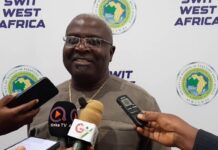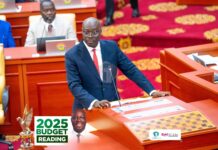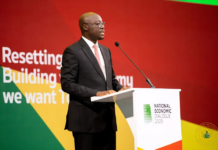
The Bank of Ghana’s (BoG) posture on blockchain – referred to as a digital register in which transactions made in bitcoin or another cryptocurrency are recorded chronologically and publicly could scupper the rather positive impact that it can make on the country’s economy.
According to Eric O. A. Annan, a blockchain entrepreneur and Chief Executive Officer of KuBitX, the BoG needs to be proactive in coming up with a legal framework on cryptocurrency – a digital asset designed to work as a medium of exchange, which is one of the components of blockchain – rather than adopting a defensive posture.
The central bank has on several occasions stated that blockchain is unreliable and that people should desist from dealing in it.
Eric Annan argues, however, that millions of transactions are taking place daily; and that instead of just warning people not to deal in cryptocurrency because it is unreliable, the financial sector regulator should rather initiate steps to provide a regulatory framework on digital currencies.
“The attitude of the Bank of Ghana on this matter is what I call an African problem: we do not want to learn, we are a continent so much interested in theory. However, whether the bank likes it or not, people are dealing in it and millions of transactions are done here on a daily basis,” he said.

Mr. Annan, who spoke to the B&FT at the Maiden Blockchain Ghana Summit in Accra, said central banks in some African countries including Kenya, Nigeria and Mauritius, and in the developed world, have begun taking steps to understand and provide the necessary regulations for what he described as the inevitable.
For instance, he said, Nigeria’s central bank recently assembled the country’s best brains in blockchain as part of efforts to understand how it works and how to regulate it. Similarly, he said Kenya has also set up a committee to look into blockchain and how it can be used to solve issues of land registration, monitoring natural resources, among others.
According to him, Japan has also invested about 10 percent of its national reserves in blockchain, while China has about 80 percent of blockchain projects.
“Chinese start-ups have raised over US$10billion on blockchain – and these start-ups, in less than one year, have become billion-dollar companies. These countries have built systems for their young people to create solutions, so why can’t we do the same?” he asked.
He added: “The thing about technology is that you can resist it for some time, but it will eventually overcome you. So, instead of saying ‘no’, I think we should start looking at what the developed countries are doing. We need to ask ourselves, what is America’s position on blockchain and cryptocurrency, what is China’s position? So that we can take a cue from them”.
Given that the country, and indeed the African continent, has the most active young population in the world and because young people are the ones who mostly use technology, Mr. Annan said it is in the Bank of Ghana’s interests to advise government that blockchain represents the future.
When it comes to regional trade, he said blockchain can help African countries – especially those in West Africa – to trade efficiently by eliminating the cost and third party aspect that comes with the traditional banking system.
“For example,” he explained, “if you have a business partner in Nigeria or South Africa, all you need is a blockchain wallet.”
Mr. Annan was optimistic that with the right regulation and education, blockchain technology can spur the next generation of African entrepreneurs.
“Blockchain is the next phase of the Internet. There are three phases of the Internet; the first is called Internet 1.0, which was the information stage whereby we have email; the second phase is the publication stage, wherein we had Google, Facebook; and the next phase is the Internet of value – and this is where blockchain comes in.
“Blockchain is for Africa. It does not make sense for us to trade in dollars; it does not make sense for a Ghanaian to send money to someone in Nigeria using the dollar. Why can’t I send cedis to a Nigerian to receive in Naira? Blockchain is here to change that. But, first of all, we need to understand what it is and how it works,” he concluded.
The Maiden Blockchain Ghana Summit was organised by Nick Owusu International. It brought together various experts from the financial sector and academia to speak on the need for government to adopt new technologies like blockchain to transform the economy.
thebftonline
























